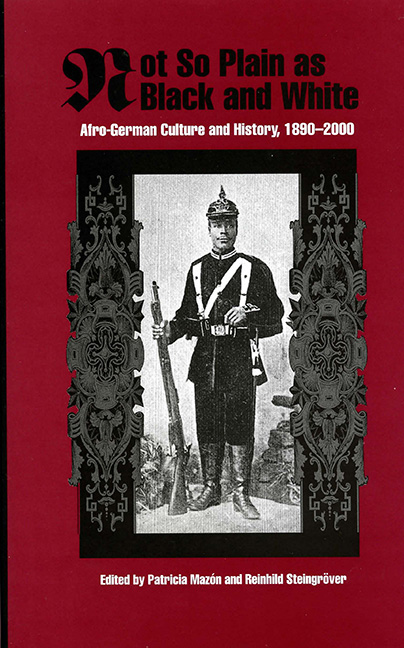Book contents
- Frontmatter
- Contents
- Foreword
- Introduction
- Part I Afro-Germans in Historical Perspective
- Part II Cultural Representations and Self-Representations of Afro-Germans
- 4 Louis Brody and the Black Presence in German Film Before 1945
- 5 Narrating “Race” in 1950s’ West Germany: The Phenomenon of the Toxi Films
- 6 Will Everything Be Fine? Anti-Racist Practice in Recent German Cinema
- 7 Writing Diasporic Identity: Afro-German Literature since 1985
- 8 The Souls of Black Volk: Contradiction? Oxymoron?
- Selected Bibliography
- Notes on Contributors
- Name Index
7 - Writing Diasporic Identity: Afro-German Literature since 1985
from Part II - Cultural Representations and Self-Representations of Afro-Germans
Published online by Cambridge University Press: 11 May 2017
- Frontmatter
- Contents
- Foreword
- Introduction
- Part I Afro-Germans in Historical Perspective
- Part II Cultural Representations and Self-Representations of Afro-Germans
- 4 Louis Brody and the Black Presence in German Film Before 1945
- 5 Narrating “Race” in 1950s’ West Germany: The Phenomenon of the Toxi Films
- 6 Will Everything Be Fine? Anti-Racist Practice in Recent German Cinema
- 7 Writing Diasporic Identity: Afro-German Literature since 1985
- 8 The Souls of Black Volk: Contradiction? Oxymoron?
- Selected Bibliography
- Notes on Contributors
- Name Index
Summary
Beginning in the late 1980s a new voice began to emerge on the German literary scene. Germans of African and/or African American descent began to speak out against the everyday racism and discrimination that was depriving them of their cultural identity as Germans. More than just articulating their victimization, these Black Germans sought to expose the origins of their victimization and in the process challenge and redefine German cultural identity to include the perspectives of race and gender.
To achieve this goal it was necessary to create a group identity through organizational activities that would encourage Germans of color to reflect on what it had meant to grow up Black in German society. As a consequence, many of the texts produced were autobiographical in nature. Surprisingly, to date few of the published texts have been authored by men. Women have been in the forefront both in the organizational as well as the publishing activities. Without slighting male authors such as Michael Hyperion Küppers or Peter Dernbach, at this point in time, Afro-German literature is primarily women's literature. In the following, we shall first consider the context and the implications of Afro-German organizational work before proceeding to a general consideration of literary texts with special emphasis on autobiography.
Surveying the German literary scene of the 1970s and 1980s, Barbara Kosta notes what she terms an “unprecedented surge of autobiographical expressions” by women. What was unprecedented about the autobiographies was their appearance at a time when the concepts of authorship, the self, and self-representation were not just challenged but considered antiquated by philosophers and cultural critics. Kosta argues, however, that the autobiographies from the two decades before reunification represent a reconceptualization of a genre firmly rooted in the Western literary canon.
Unlike the traditional, male-dominated autobiography, the texts by women demonstrate what Kosta characterizes as a “shift from an interest in displays of individualism as objective testimonies of historical processes to an interest in subjective interpretations of life.” Contrary to the declarations of the death of the author and literature itself, German women writers reconstituted the author as a structural organizing principle of the literary text but without the hegemonic claim to authority found in traditional personal narratives.
- Type
- Chapter
- Information
- Not So Plain as Black and WhiteAfro-German Culture and History, 1890–2000, pp. 183 - 208Publisher: Boydell & BrewerPrint publication year: 2005



